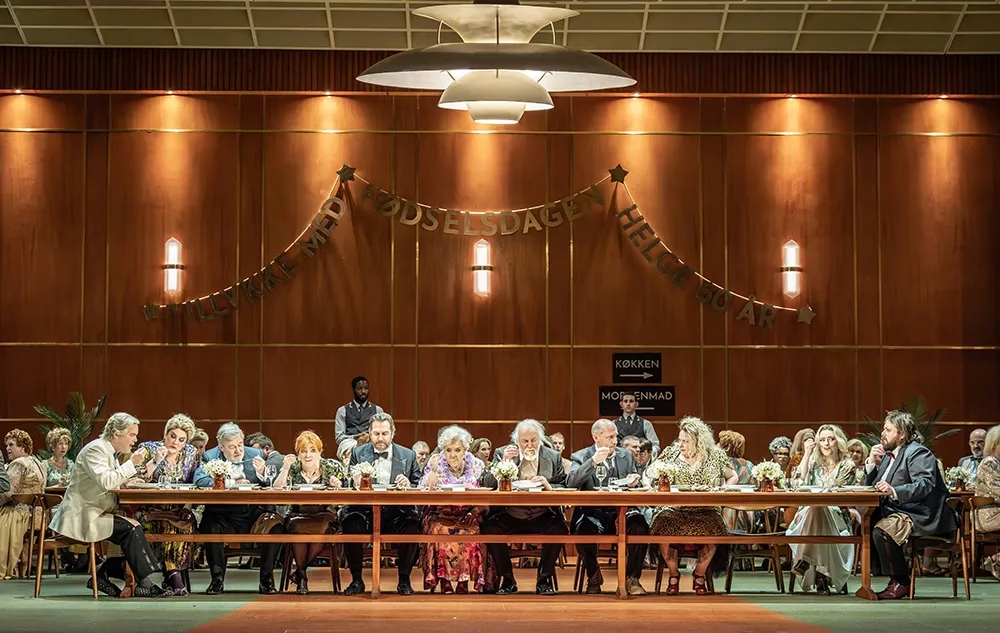World premieres in the opera scene are a rare gem, much like the triumphant unveiling of “Festen,” which grapples with unsettling themes of incest, sexual abuse, and suicide. However, the brilliance of Mark-Anthony Turnage’s music transforms this darkness into a piece that is not only shocking but also entertaining and even dazzling, infused with a sense of sardonic humor.
Adapted from Thomas Vinterberg’s 1998 film, “Festen” unfolds during the 60th birthday celebration of Helge, a family patriarch, surrounded by his wife, parents, friends, and three children—Christian, Helena, and Michael. The ghost of the fourth child, Linda, who recently passed away, looms over the festivities. From the very start, the atmosphere is charged; the strong, repetitive music, supported by an eighty-member chorus, creates a vibrant opening as they sing exuberantly about “Hello.” Yet, there’s an underlying tension, with hints of jazz and an air of hysteria brewing among the guests.
In these initial moments, the audience is captivated, much like in a horror movie, with an electric sense of foreboding. This tension persists for one hour and forty minutes, making the absence of an intermission all the more fitting.
One notable point of stillness is Helge, portrayed by Gerald Finley, who embodies an unsettling vacuum of evil. Yet, the boisterous celebration continues, punctuated by a cast ensemble riff on the word “soup,” until Christian, the elder brother played by Allan Clayton, rises to deliver a speech. This moment, which feels like a climax arriving shockingly early, actually sets the tone for the opera to follow. The melody reveals the truth: both he and his sister Linda were victims of their father’s abuse. This heart-stopping revelation, delivered with poignant simplicity by Clayton, showcases his resilience.
“Festen” is a modern exploration of confrontation and denial, as the festive spirit persists even after the grim truth surfaces. The pace escalates to a lively rumba, and the libretto by Lee Hall, performed in English, is nearly as crucial as the music itself. Their collaboration is seamless, making it impossible to discern where music ends and text begins.
The opera’s ending diverges from the original film, deepening the theme of denial. Even after a letter reveals Linda’s suicide due to Helge’s abuse, the celebrations carry on. As Hall notes, “the entire piece transcends individual tragedies, becoming an indictment of collective denial.” Helge’s wife continues to laugh and drink, even in the face of the unfolding truth.
As further anguish about Linda’s suffering emerges, Michael, previously supportive, lashes out violently at his father. Yet, Helge endures, and the day after the celebration, the guests, although shaken, resume as if nothing has happened. Turnage anticipates that viewers familiar with the film may expect something bleak, but he assures that “this is not a grim 90 minutes in the theater.” Indeed, Director Richard Jones describes the narrative as “thrilling and audacious,” capturing the essence of its complexity. Despite the dark humor and engaging staging, the core remains tragic. The sole glimmer of hope arises from Linda, beautifully sung by Marta Fontanals-Simmons, who echoes Julian of Norwich’s comforting words: “And all shall be well, and all manner of things shall be well.” Turnage identifies this as the opera’s climax—the redemption of the victim.
The performances throughout are infused with energy and commitment, even in minor roles. Set designer Miriam Buether crafts a sleek hotel-inspired backdrop that perfectly complements the unfolding drama, while the dynamic movements of the large cast, choreographed by Lucy Burge, mirror the rapid tempo of the music, expertly conducted by Edward Gardner.
“Festen” stands as a triumph for the Royal Opera House, poised to make waves on the global stage and marking a significant milestone in Mark-Anthony Turnage’s illustrious career.
Music: Mark-Anthony Turnage
Libretto: Lee Hall
Based on the film party by Thomas Vinterberg
Conductor: Edward Gardner
Director: Richard Jones













